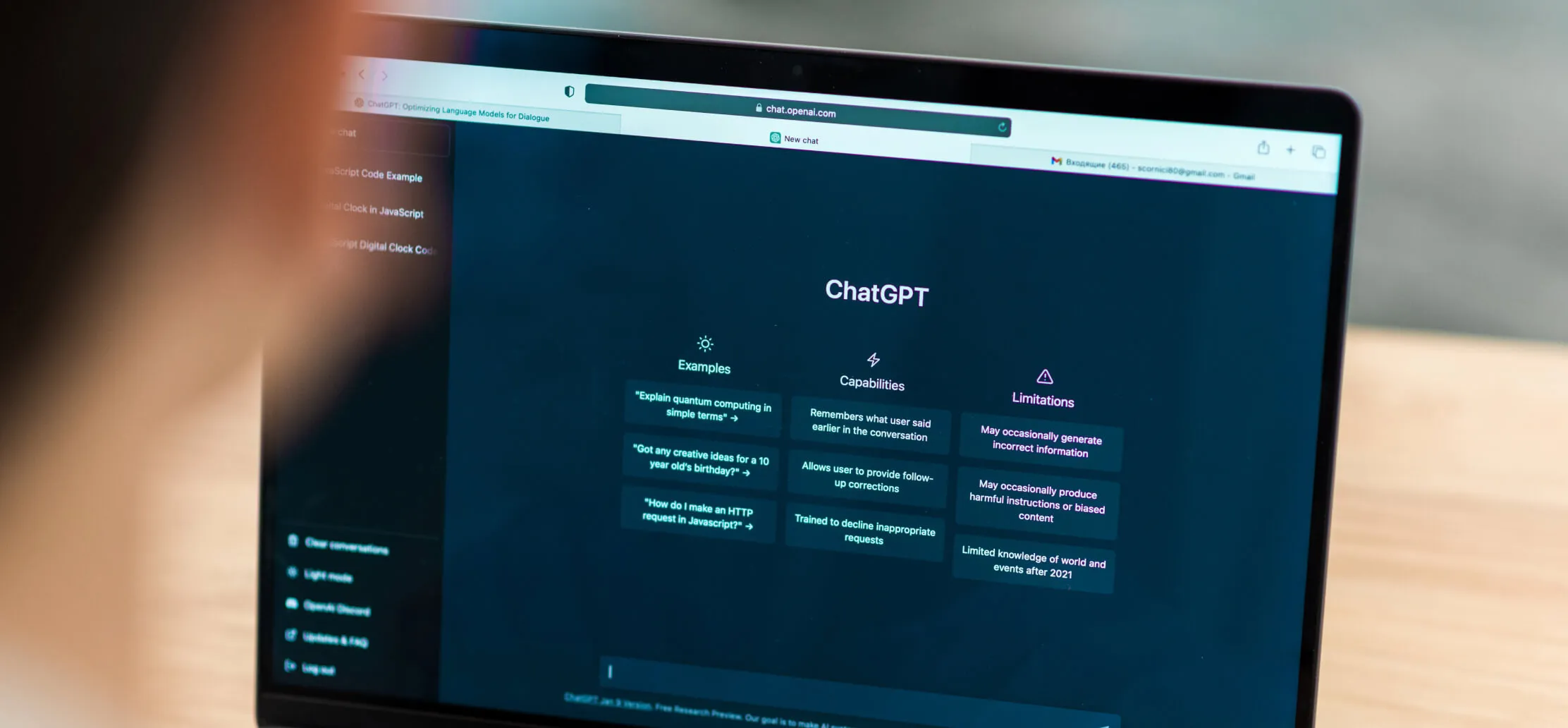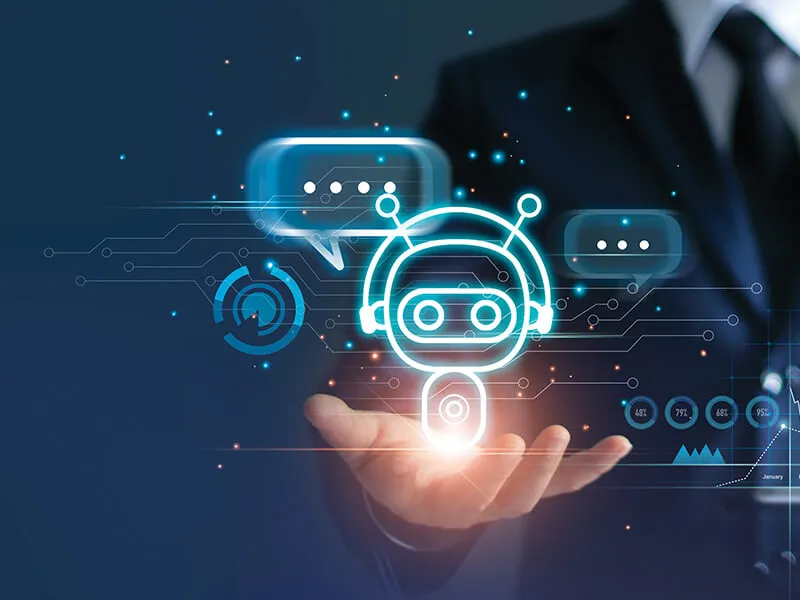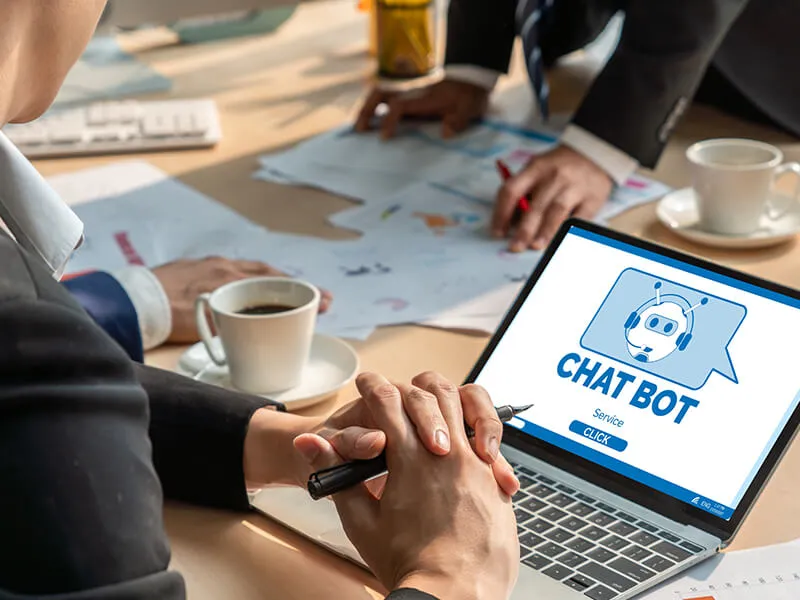ChatGPT Is the Future of Business Automation
In the ever-evolving landscape of business automation, ChatGPT emerges as a groundbreaking force, promising a transformative leap in efficiency and innovation. As industries continue to adopt digital transformation, the integration of ChatGPT technology heralds a new dawn in automating complex business processes with unprecedented ease.

Introduction
ChatGPT is a beacon of artificial intelligence that allows you to comprehend and generate human-like text and opens doors to a myriad of applications, from customer support to content creation, propelling businesses into realms of unparalleled productivity.
As we delve into the heart of this technological marvel, this blog will unravel how ChatGPT is poised to revolutionize the business landscape, offering insights into its applications, benefits, and the ethical considerations that come hand-in-hand with its integration. Join us in exploring why ChatGPT isn't just a tool; it's the future of business automation.
ChatGPT made its first inception in November 2022 and TRooTech being a leading AI/ML Development Company was among the first to decode the intricacies of this virtual conversation language model developed by OpenAI.
Our first impression of ChatGPT was an artificial intelligence tool that could generate natural language texts for various purposes, such as content creation, translation, web scraping, etc. We also understood that it could interact with users through a simple interface, where users can type in their queries or prompts, and Chatbot can generate relevant and coherent responses.
Slowly and steadily ChatGPT began to grow speedily and it touched the 1 million users mark in just 5 days.
Our AI developers started to devote and invest more time into understanding its models and architectures. From initial research and study, what we could make out is that ChatGPT is a chatty knowledgeable buddy, always ready to chat about almost anything. Whether you're seeking information, brainstorming ideas, or just looking for a friendly chat, ChatGPT is here to engage naturally and conversationally. It can understand and generate human-like text, making interactions with it feel surprisingly real.
We also found that ChatGPT is based on GPT-3, one of the most advanced language models in the world, that can learn from any text data it is given and can adapt to different domains and tasks with minimal fine-tuning.
We were happy to discover that this AI-based chatbot tool is written and developed in Python, a language TRooTech holds in-depth expertise in. We knew that it would be a game-changing technology that could revolutionize the way we communicate and learn. By leveraging ChatGPT, users can get instant answers, find creative inspiration, learn something new, and have fun.
After ChatGPT became one of the most successful launches in the IT industry and a huge hit among users, OpenAI came with its upgraded version ChatGPT 4.0 in April 2023, which could hear, and speak, which means users can show images, and create images by describing them, or use voice to chat.
It is not free though. Users are required to pay $20 per month to access the latest edition with additional tools like DALL·E, Browsing, Advanced Data Analysis, and more.
How Does ChatGPT Work?
One of our Senior AI ML Engineers when first explored ChatGPT upon its launch, he shared that ChatGPT is a Generative Pre-trained Transformer that stands for GPT and a language model based on the GPT-3.0 architecture. To further clarify he added that it employs a deep neural network with billions of parameters, making it one of the largest language models to date. The model is trained using a diverse range of internet text, allowing it to grasp contextual patterns, language nuances, and information across various domains.
He further learned that as you train the model, it learns to predict the next word in a sentence by analyzing the context provided by the preceding words. This process enables it to generate coherent and contextually relevant responses when given a prompt. The model's extensive training data and parameter count contribute to its ability to understand and generate human-like text.
Our AI ML engineer has worked on diverse AI and ChatGPT projects. Hence, sharing his knowledge on GPT working he says that it relies on a transformer architecture, which facilitates efficient processing of long-range dependencies in text. The transformer's self-attention mechanism allows the model to weigh the importance of different words in a sentence, enhancing its contextual understanding.
He further said that in practice, users interact with ChatGPT by providing prompts or queries, and the model generates responses based on its learned patterns. While powerful, ChatGPT may sometimes produce responses that are factually incorrect or exhibit biases present in the training data, emphasizing the importance of critical interpretation when using its outputs.
Integrate Artificial Intelligence to Generate Natural Language Texts and Ask Anything
Revolutionize the Way Your Business Communicates and Learns
How Businesses Can Use ChatGPT to Automate Processes?

Our AI ML experts at TRooTech have been continuously exploring use cases of ChatGPT since its launch and in that process we found that businesses in almost every industry can leverage ChatGPT to automate processes in various ways, enhancing efficiency and customer engagement.
- Automate Customer Support
Firstly, ChatGPT can be integrated into customer support systems to handle routine queries and provide instant responses, freeing up human agents for more complex issues. This ensures 24/7 availability and improves overall customer satisfaction. - Streamline Communication
Additionally, ChatGPT can streamline internal communication by acting as a virtual assistant, scheduling meetings, and answering common employee queries. This reduces the administrative burden on staff, allowing them to focus on more strategic tasks. - Offers Personalized Recommendations
Furthermore, in e-commerce, ChatGPT can be employed to assist customers in finding products, offering personalized recommendations, and guiding them through the purchasing process. This not only enhances the shopping experience but also increases conversion rates. - Real-Time Data Analysis
Also, ChatGPT can be used in data analysis, summarizing large volumes of information and providing insights. Businesses can automate the extraction of relevant information from documents, emails, and reports, saving time and improving decision-making processes. - Automate Lead Generation and Qualification
Moreover, ChatGPT can assist in lead generation and qualification. By engaging with website visitors and potential customers conversationally, it can collect relevant information and assess their needs, providing valuable data for sales teams to follow up on. This can significantly streamline the sales process and improve conversion rates. - Content Creation
It can generate marketing copy, blog posts, and social media updates, ensuring a consistent and engaging online presence. This saves time and allows companies to maintain a dynamic and up-to-date communication strategy.
Hence, integrating ChatGPT into various aspects of business operations can lead to significant time and resource savings. By automating routine tasks, businesses can enhance productivity, provide better customer service, and stay competitive in today's fast-paced environment.
Use ChatGPT to Automate Customer Service Inquiries and Get Accurate Responses
Leverage the Power of ChatGPT to Automate Various Processes
What are the Benefits of ChatGPT for Businesses?

We already know that ChatGPT has already become more than a buzzword and if we look at the stats, 49% of businesses are using it presently, while 30% are planning to implement it in the future. Our AI ML development team discovered the true benefits of ChatGPT for business while working on real-time projects. We found out that the advantages of this AI-powered system are much more than contributing to increased efficiency, enhanced customer experience, and improved overall operations.
- Enhanced Scalability: ChatGPT allows businesses to scale their operations without a linear increase in human resources. As the demand for customer support, data analysis, or content creation grows, the AI model can seamlessly handle a higher volume of tasks, ensuring that businesses can expand their services efficiently.
- Quick Adoption and Implementation: Implementing ChatGPT in business processes is relatively quick and straightforward. Businesses can integrate the model into their existing systems, making it a cost-effective solution for those looking to automate tasks rapidly without significant disruptions to their current workflows. This quick adoption facilitates a faster return on investment and a more agile response to changing business needs.
- 24/7 Customer Support: ChatGPT can provide round-the-clock customer support, addressing common queries and issues instantly. This ensures that customers receive timely assistance, leading to higher satisfaction and improved loyalty.
- Cost Efficiency: Automating routine tasks with ChatGPT can lead to significant cost savings. Businesses can allocate human resources to more strategic and complex activities, while repetitive and time-consuming tasks are handled efficiently by the AI model.
- Increased Productivity: By automating processes such as data analysis, content creation, and internal communication, ChatGPT allows employees to focus on higher-value tasks. This boost in productivity can positively impact the overall efficiency and innovation within the organization.
- Personalized Customer Experiences: ChatGPT's ability to analyze customer data enables businesses to offer personalized recommendations, promotions, and interactions. This personalized approach enhances customer satisfaction, engagement, and loyalty.
- Streamlined Communication: As a virtual assistant, ChatGPT can facilitate internal communication by scheduling meetings, answering common employee queries, and assisting with administrative tasks. This streamlines communication processes and fosters a more collaborative work environment.
- Data Analysis and Insights: ChatGPT can assist in analyzing large volumes of data, summarizing information, and providing valuable insights. This helps businesses make informed decisions and stay ahead in a competitive market.
- Marketing and Content Creation: ChatGPT can generate marketing copy, blog posts, and social media updates, saving time and resources for businesses. This ensures a consistent and engaging online presence, contributing to effective marketing strategies.
- Lead Generation and Qualification: By engaging with website visitors and potential customers, ChatGPT can collect data and assess their needs. This information is valuable for sales teams, streamlining the lead generation and qualification process.
Unleash the Various Benefits of ChaGPT to Take Your Business to the Next Level
Use ChatGPT to Manage Projects and Tasks to Gain Efficiency
Core Challenges of Integrating ChatGPT Into Business Process
While integrating ChatGPT into business processes can bring about significant benefits, businesses need to understand and address the challenges involved. Our AI ML Engineer significantly catered to a few intricate challenges while doing the ChatGPT projects. He has explained a few core issues of implementing ChatGPT into business operations, which are as follows
- Unclear Problems and KPIs: Unlike traditional methods for innovation, such as design thinking, ChatGPT poses a fundamentally different challenge because there are no clear problems to address, user pain points to alleviate, or KPIs to achieve.
- Organizational Change: Integrating ChatGPT into an organization involves much more than just implementing new technology. It requires a shift in mindset, a change in organizational culture, and the adoption of new infrastructure and software development methodologies.
- Technical Complexity: The actual implementation of ChatGPT into an existing business system depends on the complexity of the application and how the business plans on using natural language processing. This can make the integration process challenging.
- Risk of Misunderstandings: As sophisticated as ChatGPT is, it's not always perfect at understanding and responding to human language. Misinterpretations can occur, which can result in incorrect or irrelevant responses. This can lead to confusion or frustration for the users interacting with the system. Ensuring clarity and accuracy in communication is a major challenge when integrating any AI model, including ChatGPT.
- Data Privacy and Security Concerns: Utilizing AI and machine learning models involves processing large amounts of data. When customer data is involved, there are significant privacy and security concerns. Businesses must ensure that the integration of ChatGPT complies with all relevant data protection laws and regulations. Moreover, there is a risk of the AI unintentionally generating sensitive or confidential information in its responses, which needs to be carefully managed.
ChatGPT Applications in Different Industries

TRooTech has continuously explored, analyzed, and evaluated different ChatGPT use cases in diverse industry verticals ever since its release in 2022. Our AI ML developers, consultants, and engineers have conclusive evidence that it can significantly transform business processes. Here are a few industries reaping the benefits of this AI-based chatbot tool.
ChatGPT for Supply Chain and Logistics
- Data Analysis: ChatGPT can analyze large amounts of data from different sources, identify patterns, and generate useful insights to support decision-making in supply chain management. It can help supply chain professionals identify areas of improvement and enhance efficiency by analyzing data.
- Predictive Analytics: ChatGPT can be trained on historical data to predict prospective supply chain delays or interruptions/disruptions, enabling businesses to manage logistics and transportation operations proactively.
- Inventory Tracking: It can automate inventory tracking by quickly and accurately determining when products are running short, helping businesses maintain optimal inventory levels.
- Logistics Automation: It automates various logistics tasks, such as order processing, route planning, and identifying cost-effective packaging options It can help managers analyze a list of suppliers to find those with the best rates.
- Communication and Customer Service: ChatGPT can enhance communication within supply chains by providing real-time information and streamlining communication between different parties. It can also be used for automated customer support, improving overall customer experience.
- Document Generation: ChatGPT can be used for automatic document generation, leveraging its ability to recognize, summarize, translate, predict, and generate text based on acquired knowledge.
ChatGPT for eCommerce
- Product Descriptions - ChatGPT in eCommerce helps to generate product descriptions by providing detailed and personalized descriptions based on product type, features, and common uses.
- Content Creation - It allows businesses to create creative and engaging content for their websites, blogs, and marketing materials.
- Optimized Product Listings - Sellers on marketplaces like Amazon or Walmart can leverage ChatGPT to create compelling and keyword-optimized product listings.
- Lead Generation - ChatGPT can also assist in lead-generation efforts. It can engage with potential customers visiting a website and evaluate their qualifications as good-quality leads by asking qualifying questions.
- Create Social Media Campaigns - ChatGPT can be a valuable tool for creating and optimizing social media campaigns. It can assist with content creation, idea generation, and audience engagement.
ChatGPT for FinTech
- Customer Support and Assistance - ChatGPT has revolutionized customer service by providing real-time assistance and support. It can help explain financial products and services and answer questions instantly.
- Financial Planning and Advice - The AI-powered tool can analyze financial data to provide personalized advice on financial planning, budgeting, and investment.
- Fraud Detection and Security - ChatGPT detects fraud in finance by analyzing text-based data, such as emails, chat messages, and social media posts, and identifying patterns and anomalies that indicate fraudulent activity.
- Automated Investment Decisions - ChatGPT can help users make informed investment decisions by identifying market trends, historical data, and user preferences. It can help frame investment strategies.
- Credit Scoring and Risk Assessment - ChatGPT's role in credit scoring is to analyze user data and provide personalized insights for lenders, helping them make informed decisions about loan approvals and interest rates.
ChatGPT in Healthcare
- Personalized Treatment Plans: ChatGPT can analyze patient data and provide personalized treatment recommendations, helping healthcare providers deliver tailored care.
- Remote Patient Monitoring: ChatGPT can monitor patients remotely by analyzing data from wearables and sensors, providing real-time insights into a patient's health status.
- Medical Education and Clinical Management: ChatGPT can assist in medical education by generating exercises, quizzes, and scenarios for classroom use. It can also help with grading assignments and generating research aids like bibliographies and outlines.
- Patient Education and Health Literacy: ChatGPT can be used as a chatbot to provide health literacy education to patients, answering their questions and providing information about medical conditions, treatments, and preventive measures.
- Research and Data Analysis: ChatGPT can assist medical researchers by helping with literature reviews, data analysis, and summarizing relevant articles. It can also generate scholarly content and assist in generating research outlines.
ChatGPT in Education
- Personalized Lesson Plans: ChatGPT can generate personalized lesson plans for each student, catering to their learning styles and needs.
- Classroom Activities and Exercises: ChatGPT can generate ideas for classroom activities, such as writing scripts or engaging in debates, providing creative and interactive learning experiences.
- After-Hours Tutoring: ChatGPT can serve as an after-hours tutor, explaining complex concepts in a way that is easily understandable for students.
- Writing Assistance: ChatGPT can be used as a tool to improve students' writing skills. It can provide feedback, suggest improvements, and help with grammar and structure.
- Research and Information Retrieval: ChatGPT can assist students in conducting research, summarizing articles, and generating outlines for their projects and assignments.
Steps to Implement ChatGPT in Business
- Identify the use case: ChatGPT has many potential use cases for businesses, such as customer service, social media management, email management, product descriptions, content creation, and more. You need to identify the specific problem or goal that you want to solve or achieve with ChatGPT, and the domain and task that you want to apply it to.
- Choose the platform: ChatGPT can be accessed and integrated through various platforms and tools, such as Zapier, Make, Airtable, Google Sheets, and more. You need to choose the platform that suits your needs and preferences, and that offers the features and functionalities that you require.
- Fine-tune the model: ChatGPT can learn from any text data it is given and can adapt to different domains and tasks with minimal fine-tuning. However, to truly maximize the benefits of ChatGPT, you need to fine-tune the model to meet your specific needs and objectives. You can do this by providing ChatGPT with relevant and high-quality data, such as your content, customer feedback, industry terms, etc., and by adjusting the parameters and settings of the model, such as the temperature, the top-k, the top-p, etc.
- Test and evaluate the results: ChatGPT can generate natural language texts that are relevant and coherent, but not always accurate or reliable. You need to test and evaluate the results of ChatGPT and compare them with your expectations and standards. You can do this by using various metrics and methods, such as accuracy, fluency, diversity, readability, etc., and by soliciting feedback from your customers, partners, or employees.
- Monitor and improve performance: ChatGPT is constantly learning and improving, so you need to monitor and improve its performance over time. You can do this by updating and expanding the data that you provide to ChatGPT, fine-tuning the model with new parameters and settings, and incorporating new features and capabilities that ChatGPT may offer in the future.
What is the Future of ChatGPT in Business Automation?
From what we have explored ChatGPT so far, we can certainly say that this AI chatbot developed by OpenAI, is showing immense promise in the realm of business automation. The projects that we have done until today have allowed us to streamline our operations and automate routine tasks, thereby increasing efficiency and reducing costs. The technology is continually evolving, and with its potential to revolutionize business automation, it's poised to play a significant role in the future of businesses.
This is evident from the latest stats and numbers which say that nearly 1.5 million users used the ChatGPT tool in December 2023. Statista reveals that companies have saved nearly $5,000 to $7,000 by using ChatGPT.
OpenAI released the ChatGPT 4.0 version in March 2023, which can speak, hear, and chat like humans. It has added newer features with improved capabilities and enhanced possibilities.
However, this transition to AI-based automation might also necessitate substantial adaptations in business operations. While it's predicted that the application of technology like ChatGPT could lead to cost-savings and competitive advantages, it could also disrupt traditional business models and job roles. Hence, as we embrace the potential of AI, businesses must also prepare for the changes it brings, ensuring a balanced and inclusive transition into this new era of automation.
Explore the Whole World of Possibilities and Unleash Imagination With ChatGPT
Get Unique Ideas and Creative Content for Your Next Project
FAQs
The future of ChatGPT is bright! We're constantly witnessing improvement in its ability to understand and respond to users better. Expect more personalized conversations, where ChatGPT learns from users' interactions to provide even more helpful and relevant responses. As technology evolves, ChatGPT may also start understanding images, audio, and video, making conversations even more engaging. Creators ensure that the ChatGPT remains ethical, fair, and trustworthy, so users can rely on it for a wide range of tasks. In short, the future of ChatGPT holds exciting possibilities for more intelligent and helpful handy tools.
ChatGPT revolutionizes business operations with automated customer support, content creation, meeting summaries, language translation, task automation, training/onboarding assistance, and market research. It streamlines operations, improves customer service, and provides valuable insights, ensuring businesses stay competitive effortlessly.
Integrating ChatGPT into business operations offers numerous advantages. It enables round-the-clock customer support, scalable operations, cost-effective solutions, enhanced efficiency, personalized interactions, valuable data insights, multilingual support, brand consistency, scalable training, and a competitive edge. This integration empowers businesses to deliver exceptional customer experiences, improve operational efficiency, and maintain a competitive edge in the market.
Automation holds immense potential to revolutionize various industries, offering benefits such as increased efficiency, productivity, and safety. However, it also brings challenges such as job displacement and ethical considerations. Overall, automation will reshape workplaces and economies, requiring proactive strategies to ensure equitable outcomes and responsible deployment.
For businesses integrating ChatGPT into their operations, the impact on automation and data is profound. ChatGPT streamlines tasks such as customer support and content generation, allowing more time for complex activities. It analyzes text data to provide valuable insights, enabling data-driven decision-making. With its natural language understanding, ChatGPT fosters personalized interactions, enhancing customer engagement. However, businesses must address concerns about data privacy, security, and biases inherited from training data. In essence, integrating ChatGPT improves efficiency, generates insights, and enables personalized interactions, but ethical and secure usage must be prioritized.

